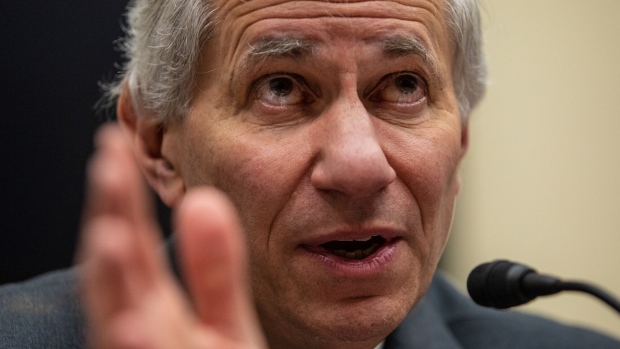May 11, 2023
Big Banks Face Billions in Extra FDIC Fees to Cover SVB Failure
, Bloomberg News

(Bloomberg) -- The largest banks face billions of dollars in extra fees to replenish the US government’s bedrock deposit insurance fund after it was tapped to backstop uninsured depositors at Silicon Valley Bank and Signature Bank.
The so-called special assessment that the Federal Deposit Insurance Corp. laid out on Thursday stems from the regulator’s extraordinary decision in March to insure all deposits at the two failed lenders. The FDIC estimates that move cost its Deposit Insurance Fund, which is typically used to cover only as much as $250,000 in an account, about $15.8 billion.
Although the plan could be tweaked in the coming months based on public comment before it is finalized, the FDIC made clear that big banks will be on the hook. The agency said that institutions with more than $50 billion in assets would pay 95% of the fees, and those with less than $5 billion wouldn’t have to pay.
“In general, large banks with large amounts of uninsured deposits benefited the most,” FDIC Chairman Martin Gruenberg said. The payments can be made in eight installments quarterly starting in 2024, and the agency projects that 113 banks out of thousands in the US would have face them.
The extra fees would be collected at an annual rate of about 12.5 basis points over the eight periods. Gruenberg said that if lenders took the effects on capital and income from the fees in one quarter only, it would result in an estimated average reduction in income of 17.5% for those three months.
The FDIC says the eight quarters to pay the assessments should help mitigate any liquidity concerns from lenders.
An FDIC official told reporters that the hit to income at the nation’s largest banks would be small and manageable. The person, who asked not to be identified to discuss the plan, said the special assessment could be halted if less money is ultimately needed than currently projected.
Political Battle
Regardless, the proposal will immediately add fuel to a political battle raging in Washington over who will pay to refill the fund, which is known as the DIF. Smaller banks have lobbied hard to avoid paying the so-called special assessment fees, in addition to the contributions that all lenders make to fund quarterly.
Rebeca Romero Rainey, the head of the Independent Community Bankers of America, said her group and the smaller lenders it represents “commend the FDIC” for its plan. She added that the proposal “recognizes the importance of distinguishing large banks that pose systemic risk to the financial system from the thousands of local community banks that serve consumers and small businesses.”
Separately, the agency is poised to announce changes to the regular quarterly fees that banks have to pay into the DIF. That plan will help blunt any impact from the First Republic to the DIF, Bloomberg News has reported.
The FDIC’s move to use the DIF to cover uninsured depositors jump-started a long-simmering debate over whether the $250,000 cap needs to be raised. Earlier this month, the FDIC said it supported expanding coverage to business and laid out three options for overhauling the fund.
Beyond Thursday’s special assessment proposal, and the broader overhaul considerations, the agency is also poised to announce changes to the regular quarterly fees that banks have to pay into the DIF. That plan will help blunt any impact from the First Republic to the DIF, Bloomberg reported last week.
A majority of the five-member FDIC board voted to propose the measure at a meeting on Thursday, with the two Republicans opposed. The agency will take comment on the plan for 60 days and make tweaks before holding another vote to finalize the plan.
(Updates with details of the FDIC plan starting in the fifth paragraph and comment from bank group in ninth paragraph.)
©2023 Bloomberg L.P.


